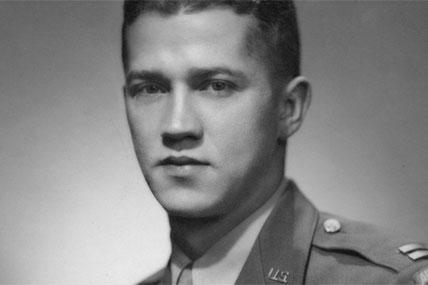For the first time, U.S. search and forensic teams have brought back and identified the remains of a Medal of Honor recipient -- Army Lt. Col. Don Faith -- whose selfless heroism saved countless lives in the desperate "Frozen Chosin" retreat in North Korea.
"I'm just incredulous, after all these years" that the father she barely knew has come home and will be buried on April 17 at Arlington National Cemetery, said Bobbie Broyles, who was four years old when he fell.
Broyles, of Baton Rouge, La., said she had reached the point where "it was time to be at peace with him being buried in North Korea" when specialists from the Defense Prisoner of War/Missing Personnel Office came to her home last September with documentation and DNA analysis showing that remains recovered in 2004 were those of Lt. Col. Faith.
Since then, soldiers who owe their lives to her father have filled her in on the type of man he was.
"I can tell you he cheered us up when there wasn't anything to cheer about" in the 40-below cold while trying to break through the encircling Chinese forces, Broyles said she was told.
Faith ran up and down his beleaguered lines, shouting "this is the way, c'mon, I'll take you. Just follow me." The troops he led became known as "Task Force Faith."
"He got our spirits up, so we followed him," Broyles said she was told by a former soldier in Faith's command. "I would not be alive if it weren't for your father."
The Defense Department formally announced on Wednesday that Faith's remains had been identified even as a new threat of war loomed over the peninsula from the threats of new North Korean leader Kim Jong-un.
On Thursday, President Obama awarded the Medal of Honor posthumously to Army Capt. (Chaplain) Emil Kapaun, who saved the wounded and inspired the American POWs before dying in a North Korean prison camp in 1951. His remains have not been recovered.
At the Pentagon Friday, in a ceremony installing Kapaun's name in the Pentagon's "Hall of Heroes," Defense Secretary Chuck Hagel said "we have the opportunity today to reflect on the service and sacrifice of the generation of Americans who fought in that bloody conflict, which has sometimes been called the forgotten war."
"But ceremonies like this prove that we will never forget the quiet heroes of the Korean War," Hagel said. "Today we also remember more than 7,900 American service members still missing from the Korean War."
Last year, DPMO was set to renew searches in North Korea, including sites at the Chosin Reservoir, but that mission "was suspended because of provocative actions by that nation's government," Hagel said.
"This is a humanitarian mission, and we look forward to the day when conditions permit these operations in North Korea to resume," Hagel said.
DPMO officials could not immediately say whether Faith's remains were the first ever recovered of a Medal of Honor recipient, but Laura S. Jowdy, the archivist for the Congressional Medal of Honor Society, confirmed that Faith was the first.
The only other similar case she had on record was that of Army Capt. Jon E. Swanson, who was listed as missing when his helicopter was shot down over Cambodia in 1971.
Swanson's remains were recovered in 1995 and later identified. He had initially been awarded the Distinguished Service Cross, but the medal was later upgraded and President George W. Bush presented the Medal of Honor to Swanson's family in a 2002 White House ceremony.
"His (Swanson's) is the only other case I'm aware of where a Medal of Honor recipient's remains were identified and returned decades later from the field of battle," Jowdy said by e-mail.
Faith's Medal of Honor was awarded by President Harry S Truman in 1951 and later presented to his widow, Barbara Faith, by five-star Gen. Omar Bradley, then the first chairman of the Joint Chiefs of Staff.
Bobbie Broyles said she had only snatches of memory of her father from when the family was posted to China and then Japan after World War II. "I think I can say he was a happy person," she said.
Faith was rejected by West Point and the Army for medical reasons when he tried to join at the outbreak of World War II. After graduation from Georgetown University, he tried again and was accepted as an officer candidate.
He became a paratrooper, serving with the 82nd Airborne Division, and fought with the division across North Africa, France and Germany.
In late 1950, Faith was in command of the 1st Battalion, 32nd Infantry Regiment, which was attached to the 31st Regimental Combat Team (RCT) and was advancing along the eastern side of the Chosin Reservoir in North Korea.
From Nov. 27 to Dec. 1, the Chinese People's Volunteer Forces (CPVF) encircled and attempted to overrun the U.S. position. The 32nd Regiment suffered 90 percent casualties.
During the series of attacks, Faith's commander was killed and he assumed command of the 31st RCT, later called "Task Force Faith," as he tried to break out of the encirclement and personally led assaults on Chinese positions, the Defense Department said.
Faith was wounded by shrapnel on Dec. 1 and died the next day. His body was not recovered and he was listed as missing until 2004 -- the last time the North Koreans permitted search teams into the area.
His Medal citation said that when Faith took command "he was given the mission of attacking to join friendly elements to the south."
"Lieutenant Colonel Faith, although physically exhausted in the bitter cold, organized and launched an attack which was soon stopped by enemy fire. He ran forward under enemy small-arms and automatic weapons fire, got his men on their feet and personally led the fire attack as it blasted its way through the enemy ring," the citation read.
"As they came to a hairpin curve, enemy fire from a roadblock again pinned the column down. Lieutenant Colonel Faith organized a group of men and directed their attack on the enemy positions on the right flank. He then placed himself at the head of another group of men and in the face of direct enemy fire led an attack on the enemy roadblock, firing his pistol and throwing grenades," the citation read.
"When he had reached a position approximately 30 yards from the roadblock he was mortally wounded, but continued to direct the attack until the roadblock was overrun," the citation read.
As a girl, Bobbie Broyles said she was aware that her father was a great man, but the fact was impressed upon her while the family was at Fort Benning, Ga., after the Medal of Honor had been presented.
Broyles said she was in school but was summoned from class. She thought she had done something wrong, but she was only being taken to meet a kindly man in the uniform of a five-star general. Gen. Bradley who had come to say hello.






























